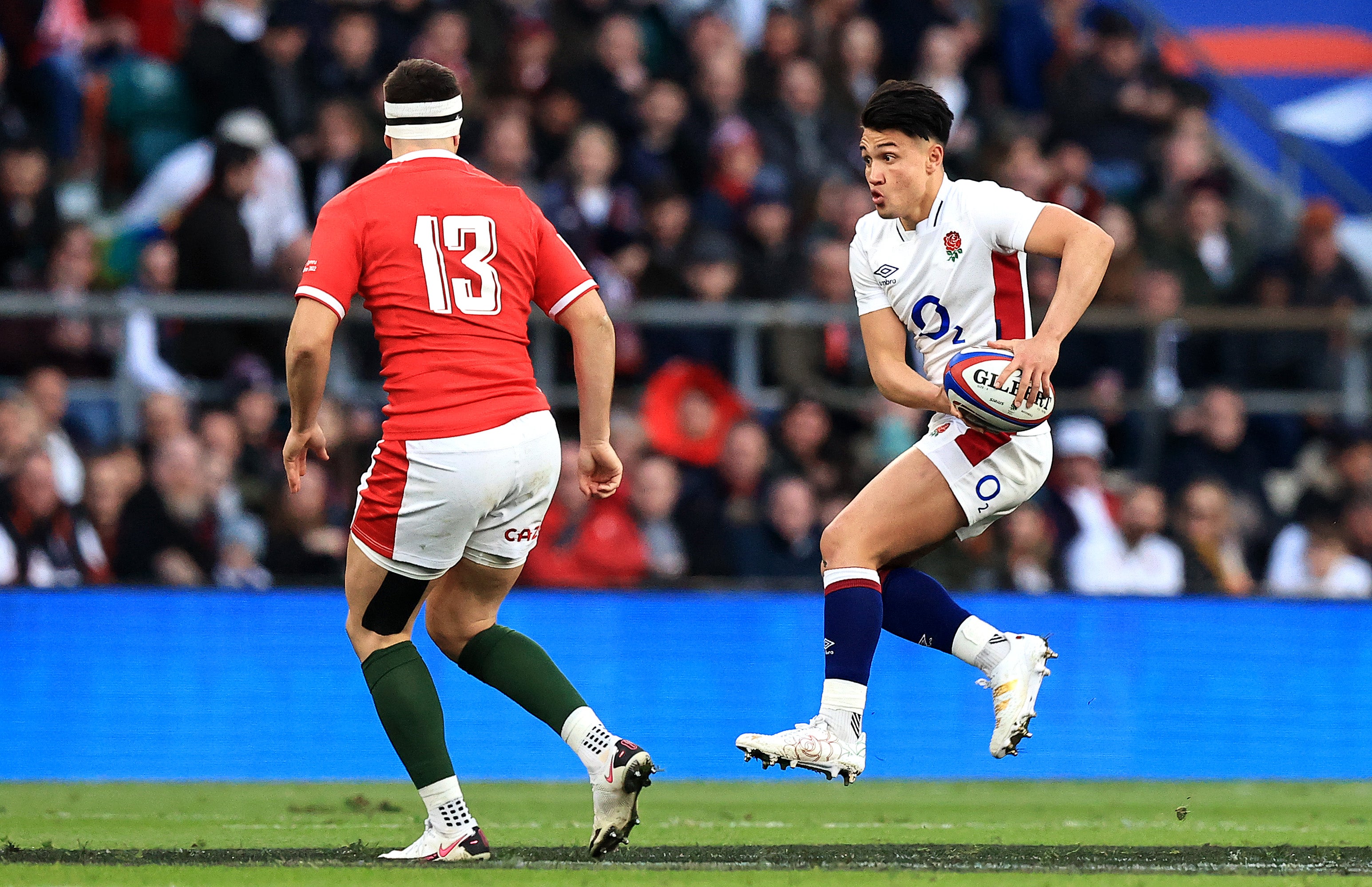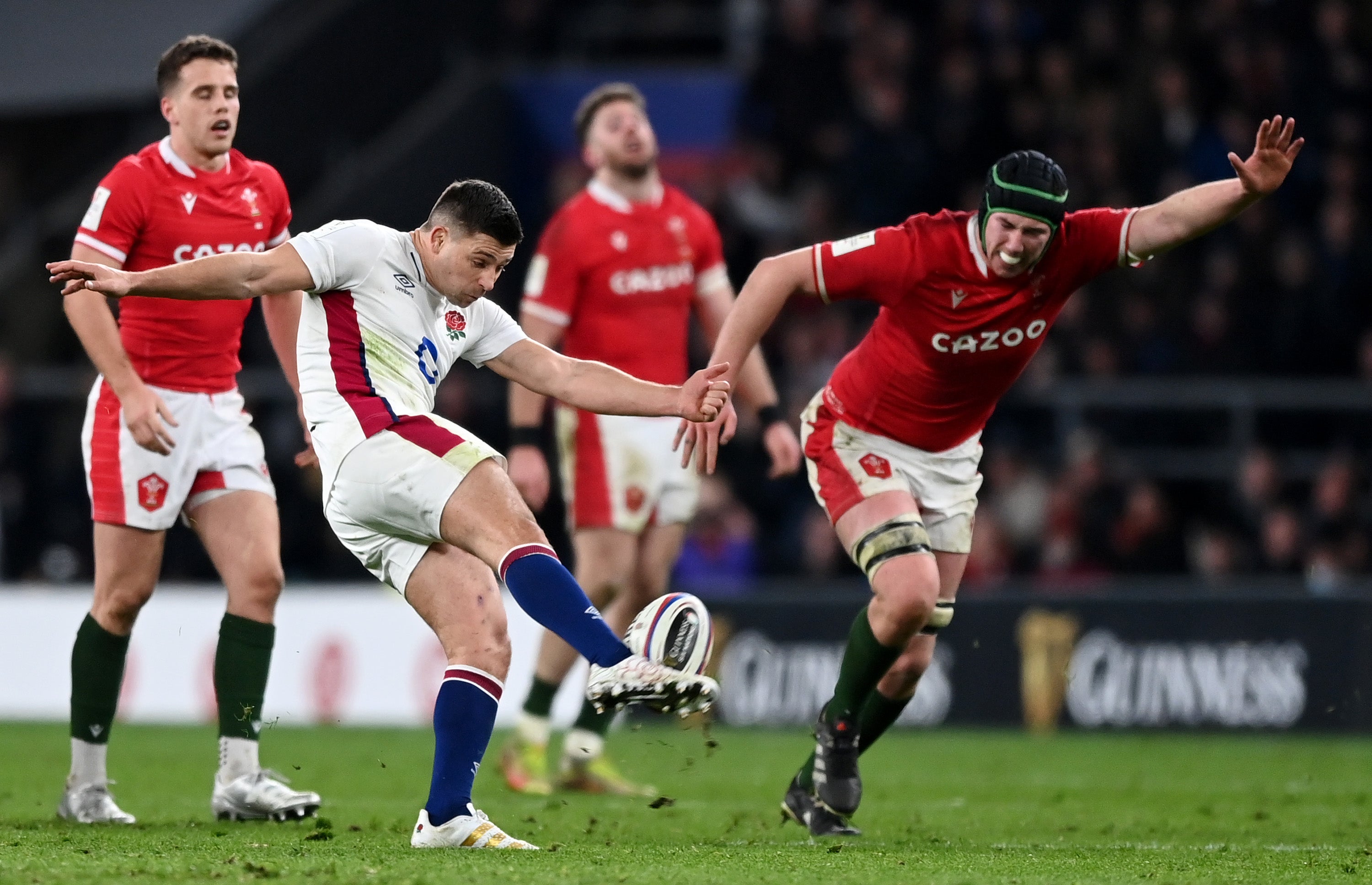England’s playmaking axis must find another gear against Ireland and France to win Six Nations
Eddie Jones has faith in the skill of Marcus Smith and Harry Randall at nine and 10, with another technical gifted player at 12 in Henry Slade, but knows England must improve in the coming weeks

Your support helps us to tell the story
From reproductive rights to climate change to Big Tech, The Independent is on the ground when the story is developing. Whether it's investigating the financials of Elon Musk's pro-Trump PAC or producing our latest documentary, 'The A Word', which shines a light on the American women fighting for reproductive rights, we know how important it is to parse out the facts from the messaging.
At such a critical moment in US history, we need reporters on the ground. Your donation allows us to keep sending journalists to speak to both sides of the story.
The Independent is trusted by Americans across the entire political spectrum. And unlike many other quality news outlets, we choose not to lock Americans out of our reporting and analysis with paywalls. We believe quality journalism should be available to everyone, paid for by those who can afford it.
Your support makes all the difference.Out of the shadows stepped Ben Youngs to make history. The February evening sun had dipped behind the Twickenham grandstand, the clock had just ticked past 60 minutes and Wales had stirred. It had been a start-stop, uneven contest to never quite enliven a returning Six Nations home crowd and the visitors had moved to within five points of England when Eddie Jones called for his record-breaker.
Enter Youngs in the twilight, replacing a fading Harry Randall, and surpassing Jason Leonard with cap 115. In truth, he was quiet: Youngs made a single tackle after making his entry. But it was a tackle crucial: dashing across to stop Alex Cuthbert in pyroclastic flow and allow Jack Nowell to jackal. Marcus Smith’s penalty nudged England out of striking distance to seal victory by the skin of gritted teeth.
“I didn’t really know what to expect, to be honest with you,” Youngs reflected afterwards. “You get the chance to go out and you want to go and do a professional job but the reception seemed incredible.
“The first half unfolded how we expected, we wanted a fast start and we were pretty dominant in that first half. We always felt Wales would come back, which they did, and we probably could have managed that period a little bit better but we found a way to win.”
The scrum-half’s introduction served a dual purpose, ensuring that England re-established control and lifting the crowd, but that should not have been necessary. Alex Dombrandt’s opportunistic score, after Maro Itoje’s lineout skulduggery went unspotted just after the interval, had appeared to have set England on their way to victory in an uneven clash of two middling, muddled sides.
Yet just as against Australia in the autumn and Scotland in round one, England failed to seize their advantage, and Wales rallied strongly. Such a pattern had been predicted but England’s failure to maintain control even when in the ascendancy is becoming a recurring theme.
Not since the 2019 World Cup have England managed to really put a team away; without Manu Tuilagi in the side, that run extends perhaps as far back as 2017 and the 61 points put on Scotland. Jones stressed that these are embryonic days after the autumn reset but England have yet to prove they can perform with the proactivity they desire.

Perhaps they will grow from this victory. Twice they managed to stall the Welsh fightback, by hook, or, in the case of Courtney Lawes’ extended hand, by crook, and Jones believes his young core stood up well.
“Sometimes we lose concentration in areas that we shouldn’t and we just got a little bit untidy in our attack and defence,” the England head coach conceded. “We are still a team that is building and developing.
“When you are playing against Wales you’ve got to play well and you’ve got to go to the last minute of the game. What we’re seeing in the early stages – if a pregnancy is nine months, we’re talking about the first two months here of where we want to be – what we’re seeing are some good signs. You don’t win a game like that unless you’ve got good spirit.
Under attack coach Martin Gleeson, England are trying to rid themselves of the rigidity of the forward pod formations favoured by most of the world’s attacks – a “free formation” that grants the 9-10-12 combination more play-making liberty.
With Tuilagi ruled out on Thursday, and Elliot Daly offering little in terms of carrying punch from 13, the burden thus fell on the forwards, Ellis Genge and Dombrandt particularly. It worked in patches, but when quick ball was stalled or the power carriers fatigued, they again looked a little short of ideas.
They still seem to be figuring out how best to use that free will. Smith’s selection as Player of the Match was a curious given the performances of some of his forwards, particularly Itoje, and those of Taulupe Faletau and Cuthbert in defeat, though he slotted six penalties. It speaks to how highly Jones rates the fly-half that he is granted such attacking autonomy so soon into his international career, but it hasn’t quite fired just yet.
This playmaking axis deserves further outings, and Jones thinks it will come together in time, but he admitted that England will have to improve against Ireland and France. “We’re definitely on the right track. We’ve just got to keep playing better, keep improving every game. We don’t fear anyone. There are three teams that can win it now and we are one of those three teams.”
France’s second-half fluency might well have felled Scotland regardless, but how different might this game have been if Scotland had taken their chance just before half-time? After a brilliant break from Duhan van der Merwe, Chris Harris romped into open expanse and had four teammates arriving to canter in to the left corner if the centre passed through the hands. Instead Harris heeded the call of his captain Stuart Hogg, an extravagant miss ball for the widest of the three that faded from the full-back, who could not grasp with line agape.
Had Harris, normally so certain in his basics, made a more straightforward choice, or Hogg cleanly gathered and gone in, Scotland would have led 17-12; as it was, there was time left before the interval for Gael Fickou to put the finishing touches on a third French masterpiece and extended the visitors’ advantage, from which point they never really looked back. Fabien Galthie’s side will take some stopping.
Full credit must go to Italy for a performance of such fight and tenacity to prevent Ireland truly romping to victory with a two-player advantage. Particular credit must be extended to front-row renaissance men Ivan Nemer and Danilo Fischetti, and to skipper Michele Lamaro, who cuts a considered figure on and off-the-pitch, for their efforts to shore up under-resourced flood defences to stem the Irish tide. Ireland seemed to be guilty of hurrying for a half-chance rather than waiting for less opaque openings to appear, even if a bonus point victory and sizeable winning margin were secured.
The by-law that saw Italy forced to remove an extra player after Hame Faiva’s dismissal left them without a qualified hooker will necessitate the latest examination and likely tweaking of the law-book – much as Faiva’s high hit was reckless and foolish, it does not feel right to doubly punish a side under these circumstances, with Gianmarco Lucchesi forced off early through injury.
Join our commenting forum
Join thought-provoking conversations, follow other Independent readers and see their replies
Comments